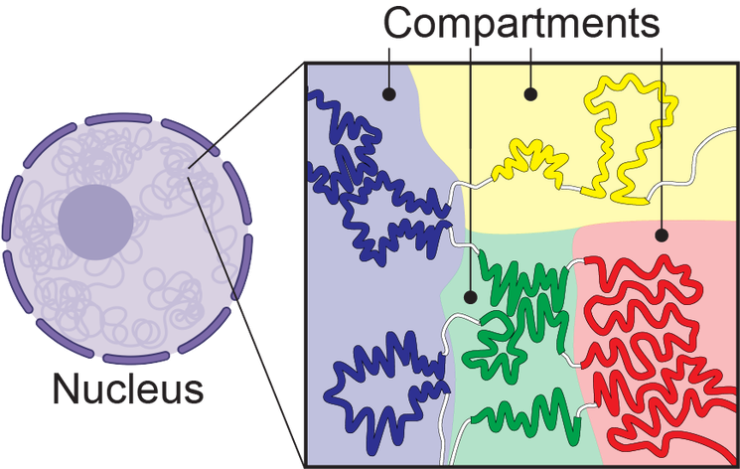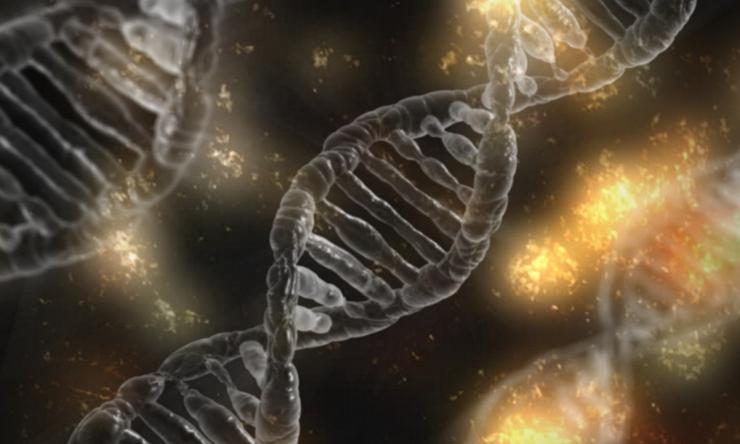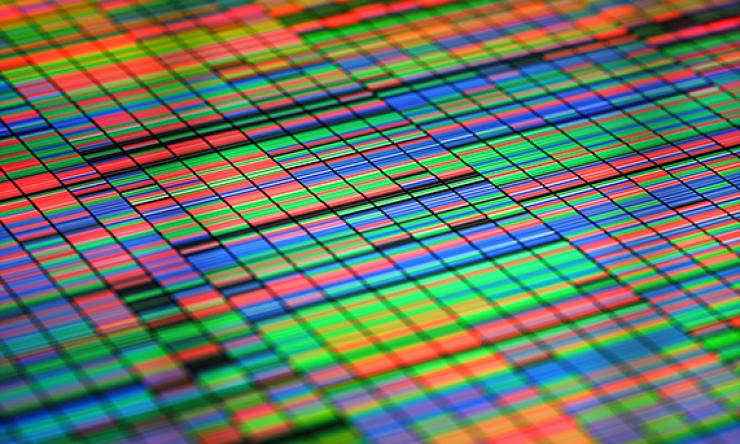Unraveling Principles of Chromatin Folding
About the Lab

The Eagen Lab aims to elucidate how DNA is folded inside cells. We are fascinated by chromosome structure and function at length scales from individual nucleosomes to whole nuclei. Current projects are focused on two related topics:
1. Nuclear Compartmentalization
Active and inactive genes are located in different regions of the nucleus, indicating that the spatial organization of DNA influences proper gene regulation. In particular, the spatial segregation of loci into distinct regions, or compartments, of the nucleus impacts diverse areas of biology, from aging and cancer to hematopoiesis and olfaction. Aberrant chromosome compartmentalization in a variety of diseases, including cancer, pathogenically rewires gene expression programs. We combine concepts and approaches from biochemistry with methods and analytical tools from cell biology, molecular biology, pharmacology, genomics, and computational biology to determine the molecular basis of how chromosomes are folded in three dimensions and compartmentalized within nuclei. Our long-term goal is to reveal fundamental principles underlying how the folding of chromosomes within nuclear compartments impacts biological function. Near-term goals are to identify the biomolecules that compartmentalize chromosomes, determine the mechanisms driving chromosome compartmentalization, and establish causal connections between nuclear compartmentalization and gene regulation. This fundamental knowledge is essential to define the pathophysiology of, and to ultimately therapeutically intervene in, diseases of altered nuclear compartmentalization.
2. Fusion Oncoprotein Biochemistry
Chromosome rearrangements can lead to gene fusions, where parts of two different genes combine to form a new, hybrid gene. Often, these fusions occur in coding regions and, in cancer, give rise to fusion oncoproteins. Many fusion oncoproteins control transcription, but most of the fusions that regulate gene expression lack enzymatic activity, so we are only beginning to understand how they function. We discovered that the BRD4-NUT fusion oncoprotein alters DNA folding, creating a nuclear compartment and upregulating transcription. We are branching out to study how other fusion oncoproteins function as well. Rather than studying a particular cancer, we take a biochemical approach and focus on how enigmatic fusion oncoproteins regulate chromatin structure and gene expression. These studies complement our interest in and enrich our understanding of how chromosomes are organized within nuclear compartments. By coupling fundamental biochemistry with cancer biology, we aim to reveal new molecular mechanisms of how fusion oncoproteins function that provide clues about nuclear organization in healthy cells. Fusion oncoproteins are unique to cancer cells, thereby marking them as precisely defined and highly selective therapeutic vulnerabilities. Therefore, our research also lays a foundation to devise new interventions for aggressive cancers that are driven by fusion oncoproteins.
Our lab is a member of the Department of Molecular and Cellular Biology. We are also affiliated with the Center for Cell and Gene Therapy (CAGT), the Center for Precision Environmental Health (CPEH), the Dan L Duncan Comprehensive Cancer Center, the Stem Cells and Regenerative Medicine (STaR) Center, and the Therapeutic Innovation Center (THINC).
Join Us!
If you're interested in job opportunities in chromosome biology and want to do exciting science, apply today!
Publications
Our research projects and studies result in publications in PubMed and other scientific journals.
Eagen Lab
Baylor College of Medicine
Michael E. DeBakey Center M804
One Baylor Plaza, BCM130
Houston, TX 77030
Office Phone: 713-798-3560 / Fax: 713-790-1275 / Email: kyle.eagen@bcm.edu











